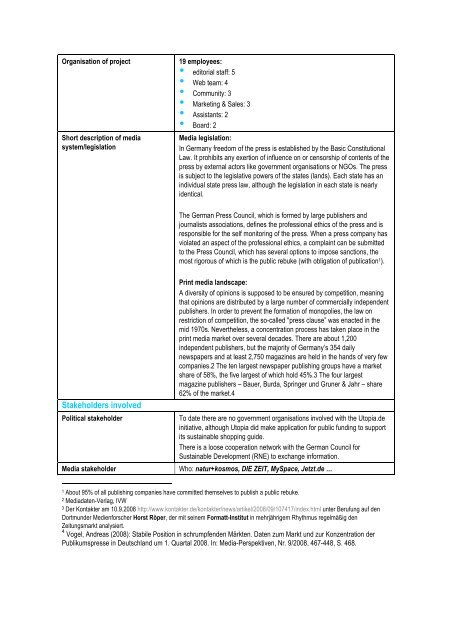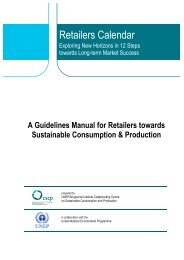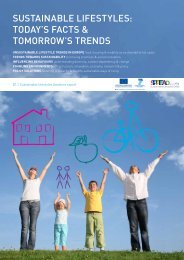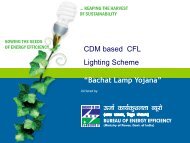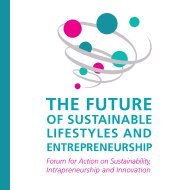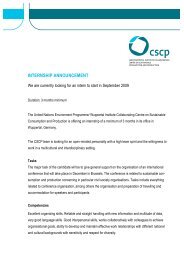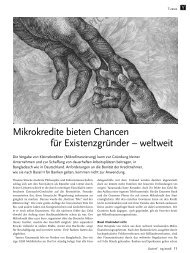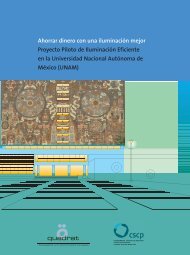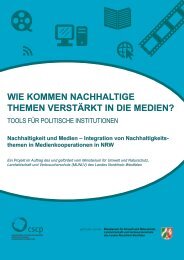integrating sustainability themes into media - Collaborating Centre ...
integrating sustainability themes into media - Collaborating Centre ...
integrating sustainability themes into media - Collaborating Centre ...
You also want an ePaper? Increase the reach of your titles
YUMPU automatically turns print PDFs into web optimized ePapers that Google loves.
Organisation of project 19 employees:<br />
• editorial staff: 5<br />
• Web team: 4<br />
• Community: 3<br />
• Marketing & Sales: 3<br />
• Assistants: 2<br />
• Board: 2<br />
Short description of <strong>media</strong><br />
system/legislation<br />
Stakeholders involved<br />
Media legislation:<br />
In Germany freedom of the press is established by the Basic Constitutional<br />
Law. It prohibits any exertion of influence on or censorship of contents of the<br />
press by external actors like government organisations or NGOs. The press<br />
is subject to the legislative powers of the states (lands). Each state has an<br />
individual state press law, although the legislation in each state is nearly<br />
identical.<br />
The German Press Council, which is formed by large publishers and<br />
journalists associations, defines the professional ethics of the press and is<br />
responsible for the self monitoring of the press. When a press company has<br />
violated an aspect of the professional ethics, a complaint can be submitted<br />
to the Press Council, which has several options to impose sanctions, the<br />
most rigorous of which is the public rebuke (with obligation of publication 1).<br />
Print <strong>media</strong> landscape:<br />
A diversity of opinions is supposed to be ensured by competition, meaning<br />
that opinions are distributed by a large number of commercially independent<br />
publishers. In order to prevent the formation of monopolies, the law on<br />
restriction of competition, the so-called "press clause” was enacted in the<br />
mid 1970s. Nevertheless, a concentration process has taken place in the<br />
print <strong>media</strong> market over several decades. There are about 1,200<br />
independent publishers, but the majority of Germany’s 354 daily<br />
newspapers and at least 2,750 magazines are held in the hands of very few<br />
companies.2 The ten largest newspaper publishing groups have a market<br />
share of 58%, the five largest of which hold 45%.3 The four largest<br />
magazine publishers – Bauer, Burda, Springer und Gruner & Jahr – share<br />
62% of the market.4<br />
Political stakeholder To date there are no government organisations involved with the Utopia.de<br />
initiative, although Utopia did make application for public funding to support<br />
its sustainable shopping guide.<br />
There is a loose cooperation network with the German Council for<br />
Sustainable Development (RNE) to exchange information.<br />
Media stakeholder Who: natur+kosmos, DIE ZEIT, MySpace, Jetzt.de …<br />
1 About 95% of all publishing companies have committed themselves to publish a public rebuke.<br />
2 Mediadaten-Verlag, IVW<br />
3 Der Kontakter am 10.9.2008 http://www.kontakter.de/kontakter/news/artikel/2008/09/107417/index.html unter Berufung auf den<br />
Dortmunder Medienforscher Horst Röper, der mit seinem Formatt-Institut in mehrjährigem Rhythmus regelmäßig den<br />
Zeitungsmarkt analysiert.<br />
4<br />
Vogel, Andreas (2008): Stabile Position in schrumpfenden Märkten. Daten zum Markt und zur Konzentration der<br />
Publikumspresse in Deutschland um 1. Quartal 2008. In: Media-Perspektiven, Nr. 9/2008, 467-448, S. 468.


